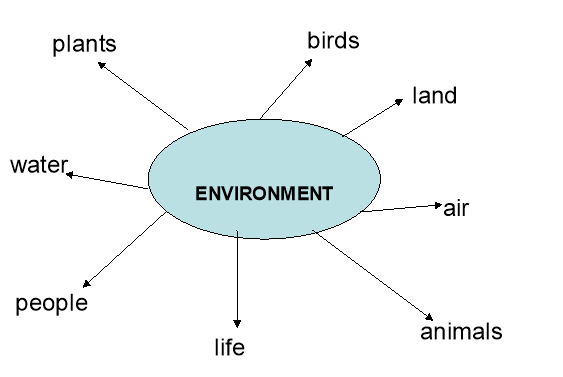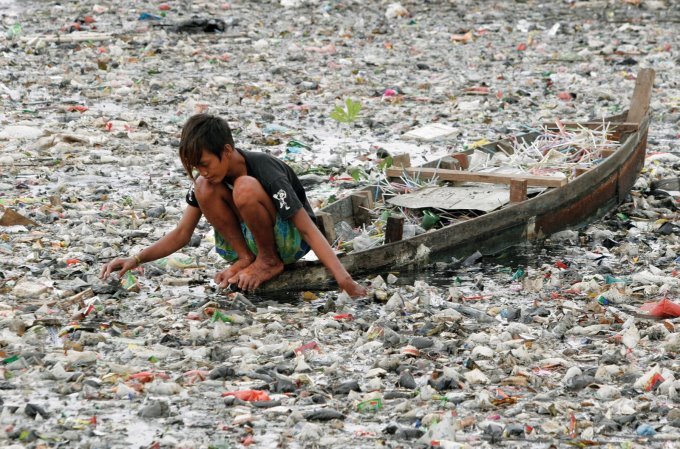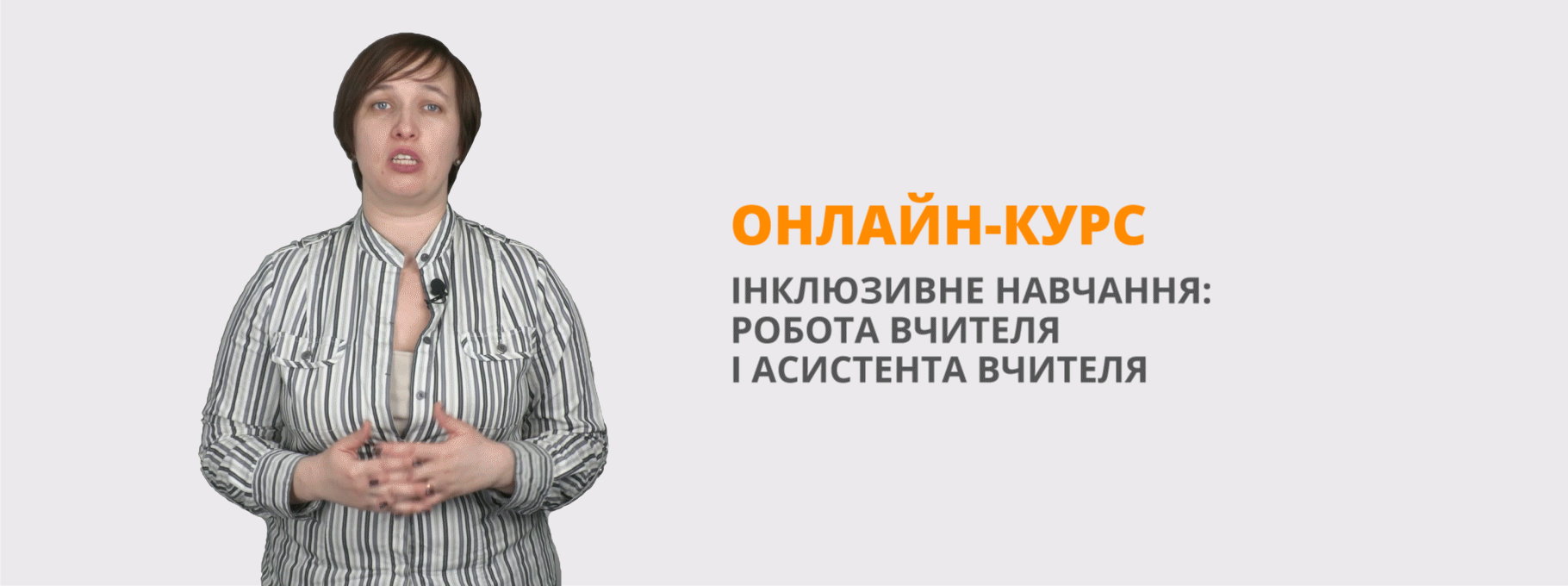"What a disaster!" розробка уроку для 10 класу на тему "Навколишнє середовище"
"What a disaster!" розробка уроку для 10 класу на тему "Навколишнє середовище"
Розроблений для підручника New Success Intermediate, але особливої прив'язки до нього не має. Розрахований на 2 уроки.
What a disaster!
Olena Azarova
a teacher of English,
Ukrainian college named after V.O.Sukhomlynskyi
Kyiv
Suggested level – pre- intermediate + intermediate
Objectives:
-to systematize knowledge on the topic
-to facilitate skills of oral free speech by eliciting personal experience &
knowledge;
-to activate the topic-related lexis;
-to increase pupils active involvement in all areas of the language practice;
-to develop the ability to work in different activities (individually, in groups,
in pairs);
-to make the pupils aware of the importance of the subject under discussion;
-to enhance the creative writing;
Facilities: cards with words, a video “Investigating Plastic Pollution”.
The Run of the lesson
- Introduction
Aim: to get students ready to perceive the information on the topic, to introduce them the task of the lesson.
https://www.youtube.com/watch?v=R6IP3_aRFtA
T: Dear pupils, today we are going to discuss the main environmental problems endangering us and the solutions to them. You’ll have the chance:
- to convey and share the information you know on the topic;
- to accumulate some knowledge and interesting facts on the topic;
- to summarize the information learnt before.
II. Get warmed up!
Aim: to introduce the subject “Environment” through personal responses, to promote working individually, in pairs, in groups.
1) What’s the environment?

And today we are discussing one of the human’s problem like “Water pollution”.
Can you give any synonym to the word “Water?” (pure, liquid, hydrogen and oxygen)
Did you know that the water we use today is the same water the dinosaurs used? We cannot create new water. For millions of years, the water we have has been used again and again. We have been able to do this because there are natural cycles that clean the water each time we use it.
III. Dictionary corner
Aim: to practice vocabulary on the topic “Environment”, the usage of synonyms.
Write the synonyms to the following words. Work in pairs. ( use cards)
Reuse = recycle
Protection = conservation
Pollution = contamination
To ruin = destroy, disrupt, damage
To rubbish = litter, trash, junk, garbage
To look after = take care
To alter = change
To keep = preserve
To waste = chemicals, fumes
IV. Speaking
Aim: to discuss environmental problems and develop key speaking skills

Look at the photo and answer the questions.
- Do you often buy water/soft drinks in plastic bottles? Why are they popular?
- In what ways do you think the fashion for water in plastic bottles could be harmful to the environment?
People are polluting our water. Businesses and cities dump chemicals and waste products into our rivers, lakes and oceans. People throw trash–furniture, garbage, old tires, cars, old fencing, anything they can think of–into the water. People also pollute the water by accident, by allowing their cars to leak oil and gas onto the ground. That oil and gas eventually washes into the water during rain storms and when people clean their driveways off with water.
Be ready to speak about water pollution. Then fill in the table.
- Why is water so important?
- How much of the earth's surface is covered by water?
- What are three forms that water takes?
- Where do people and animals get the water they need?
- How do trees in the desert get water?
V. Reading
Aim: to give main concepts of the text
The text “Not so plastic fantastic”
The pre-reading activity
What other things can we do instead of using plastic bottles?
What other materials do you think are harmful to the environment?
The while – reading activity
Quickly read the article. Tick two predictions the author clearly makes about the future. Which information in the article do you find most surprising/worrying?
- Bottled drinks are likely to fall out of fashion.
-
 The amount of plastic rubbish in the oceans will increase.
The amount of plastic rubbish in the oceans will increase.
- Many species of sea bird will probably become extinct.
-
 People may start eating food that has been contaminated with plastic.
People may start eating food that has been contaminated with plastic.
- Bottled drinks are big business nowadays. Americans get through two million plastic bottles of drink every five minutes, while here in the UK we spend one million pounds on them every day. Perhaps you are sipping mineral water from a bottle as you read this article.
- But what do you usually do with the empty bottle? Although many of us try our best to recycle our plastic rubbish, the sad fact is that only one plastic bottle in five gets recycled. The rest end up on rubbish dumps. And because plastic takes at least 400 years to decompose, our 'disposable' plastic bottles are likely to remain with us for a very long time. But it's not only on land that plastic is causing problems. Over the past decade we have discovered that there are huge areas of 'plastic soup' in our oceans. Of the billions of pieces of floating plastic rubbish which make up this 'soup', much of it is bits of plastic bottles and bottle tops. Of course, some of this rubbish comes from boats or oil and gas platforms. But most of it comes from the land and enters the sea from rivers and sewers. We now believe that ten percent of the plastic rubbish we throw away on land ends up in the sea. Globally, that's about ten million tonnes of plastic each year. This problem will definitely get worse, because plastic takes hundreds of years to break down in sea water and people are unlikely to stop using plastic bottles. One area of floating rubbish in the north Pacific is already more than twice the size of France.
- This plastic soup is already destroying the environment. Action Ecology recently spent a week on Midway Island in the Pacific Ocean, where we were looking into how plastic is harming the wildlife and slowly poisoning the environment. All over the island, we came across dead albatross chicks, whose parents had fed them bottle tops, cigarette lighters and other pieces of rubbish from the sea. I found it a truly heartbreaking sight. My team found plastic not only in the bodies of nearly half the seabirds we examined but also in dozens of other species such as fish, turtles, whales and dolphins. As more and more seafood becomes contaminated with plastic, it seems people might soon end up consuming their own rubbish. Isn't it crazy?
- For thousands of years, the ocean was a symbol of the eternal power of nature. When we looked at it, we felt small and our problems seemed trivial. But now it looks as if even something as huge as the ocean cannot cope with the amount of plastic waste that our civilisation produces.
(The author is a marine biologist who is
currently working for the charity Action Ecology.)
The post- reading activity
Read the article again. Are the statement true (T) or false (F)?
- One million people in Britain buy a bottled drink every day. F
- Most of our plastic rubbish finishes up in recycling bins. F
- Scientists already knew about the floating rubbish five years ago. T
- Ten percent of the rubbish in the sea comes from rivers and sewers. F
- The author discovered that adult albatross birds were feeding plastic to their young. T
- The ecologists on Midway Island were only interested in birds. F
- The author believes we are already producing more plastic rubbish than the ocean can deal with. T
VI. Video-watching
Aim: to give practice in identifying main concepts in the text of the film unit, to teach them to perceive not only by listening but combine it with watching.
https://www.youtube.com/watch?v=DHg291KeFls
The pre-watching activity
How is plastic useful for human?
What’s the problem with plastic bottles?
Does it affect marine organisms?
The while – watching activity
How do people pollute the water?
The post- watching activity
You have to write a leaflet where you give instructions how to prevent pollution.
e.g: There are a lot of things we can do to protect the environment.
Try not to buy pre-packaged food. It creates a lot of rubbish…
VII. Listening
Aim: to give practice in listening for specific information
Join Dan and Kate this week as they talk about pollution. How is plastic affecting the environment and what can we do to make the situation better?
The pre-listening activity
Guess!!! How many pieces of plastic are there in each square kilometre of the world’s oceans? (choose an answer now)
a) 22,000 pieces b) 38,000 pieces c) 46,000 pieces
The while – listening activity
- What is the Great Pacific Garbage Patch?
- When was it discovered?
- How large is it estimated to be?
- How many million sea birds are killed each year as a result of plastic pollution?
- What things are found in the stomachs of birds?
- What percentage of litter in the ocean was thrown away on land?
- What percentage of plastic produced each year is used for packaging?
- What are the three ‘R’s that scientists recommend?
The post- listening activity
Vocabulary - What do the following words mean?
- waste (harmful waste which has been put into the environment)
- rubbish (a British word for garbage)
- litter (another word for rubbish)
- garbage (an American word for something that's been thrown away)
- discarded (to throw something away)
- packaging (protective covering used to transport products and display a company's image)
- biodegradable (something that decays naturally)
- recycle (to process used materials into new products)
- Do you think that there will be enough interest world-wide to counteract this problem?
- Or do you think that it is already too late to reverse the damage that has been done?
- What long-term effects might this have on humans?
Teacher’s note:
BBC Learning English
6 Minute English
Plastic Pollution
Dan: Hello and welcome 6 Minute English from the BBC. I’m Dan Walker Smith
and today I’m joined by Kate.
Kate: Hello Dan.
Dan: Now today Kate and I are talking about pollution.
Kate: Yes, well pollution is the term for harmful waste which has been put into the
environment, and which can be damaging to plants and animals.
Dan: So I’m going to start the show today with a question, Kate; have you ever
heard of the ‘Great Pacific Garbage Patch’?
Kate: No, I’m afraid I haven’t; I’ve never heard of that.
Dan: Well let me explain: Garbage is an American word for something we’ve
thrown away. What we in the UK might call rubbish. And the Pacific
Garbage Patch is an area of the Pacific Ocean where rubbish has collected. It
was discovered in 1997, and is essentially a big floating soup of plastic
garbage and bits of rubbish that have been thrown away on land and have
ended up in the sea.
Kate: Ooh that sounds absolutely horrible. I had no idea that anything like that
existed.
Dan: Well this is the bit which is really scary: we don’t actually know the size of the
garbage patch, but some people say it could be 600,000 square miles across –
which is twice the size of France.
Kate: What? Twice the size of France? That’s absolutely huge!
Dan: And it could be bigger.
Kate: That’s very frightening.
Dan: So this week’s question for you Kate is: According to the United Nations, how
many pieces of plastic are there in each square kilometre of the world’s oceans?
Is it:
a) 22,000 pieces of plastic
b) 38,000
c) 46,000
Kate: Well, as I’d never heard of this problem before, I’m going to take a wild guess
and, sadly, I think I’m going to guess the top number; 46,000 pieces of plastic.
Dan: OK, well they’re all pretty big, but we’ll see if you’re right at the end of the
programme.
Kate: Now plastic pollution in the seas kills over a million sea birds and 100,000
mammals and turtles each year.
Dan: So here’s the Dutch marine biologist Jan van Franeker talking about the effects
of plastic pollution on birds. You’ll hear the word litter, which is another word
for rubbish. So what sort of litter have the scientists found in birds’ stomachs?
Extract 1
Worldwide, there’s so many bird species that have litter in their stomachs. It varies
from pieces from bottles or toys, parts from fishing nets, from ropes. Any sort of plastic
really that is broken up and is floating around the ocean.
Kate: OK, so the plastics they’re finding aren’t just things that might have been
thrown into the sea, like fishing nets and ropes, but are actually things that
have come from the land, like pieces of bottles and children’s toys.
Dan: Apparently 80% of all the plastic found in the ocean is actually litter that’s
been thrown away on land.
Kate: And part of the problem is that most plastics aren’t biodegradable. What does
the word biodegradable mean Dan?
Dan: Well, if something biodegrades it means it breaks down naturally. So if a
product isn’t biodegradable it won’t decompose or decay organically. And
some plastic bags could last in the environment for up to a thousand years.
Kate: Let’s hear the marine ecologist Richard Thompson talking about plastic
packaging. Packaging is the protective covering used to transport products
and display a company’s image. So let’s have a listen to the extract: what
percentage of plastic produced each year is used for packaging?
Extract 2
I think we need to think very very carefully about the way that we use plastics in society.
If we think that 100 million tonnes of plastic products are made every year, 40% of
those are packaging materials that are mainly used once and then discarded.
Dan: OK, so 40% of the world’s plastic is used as packaging material and then
discarded. Can you explain what discarded means Kate?
Kate: Sure: well to discard something means to throw it away. So if the packaging
is discarded, it means that people throw it away as rubbish or litter, rather
than use it again.
Dan: To lower the amount of plastic waste, scientists recommend the ‘three Rs’ for
packaging. We can reduce the amount of packaging used on products; we can
re-use packaging more than once, and we can recycle the materials used.
Kate: And recycle means to process used materials into new products. So you can
recycle old glass, paper and plastic products to make something new. Do you
recycle, Dan?
Dan: I’m actually very lucky, because where I live in London has a great recycling
programme. So essentially every week we’ve got someone who comes round
and collects all the paper and all the plastic and all the glass that I’ve used that
entire week, which is fantastic.
Kate: Oh that sounds great, you’re really lucky. Actually I’ve got the same thing: I
have all my plastics and glass picked up outside my house, so I think certain
places in the UK are doing quite well on the recycling front.
Dan: And even if you can’t recycle, just try and reuse or reduce the amount of waste
that you’re going to be producing.
OK, we’re almost out of time, so let’s go over some of the vocabulary we’ve
come across today:
pollution
garbage
rubbish
litter
biodegradable
packaging
to discard
to recycle
Dan: And finally Kate, let's go back to today's question. I asked you at the beginning
of the show how many pieces of plastic there are in each average square
kilometre of the ocean?
Kate: And I went for c, 46,000.
Dan: Well, depressingly Kate, you’re right. There are apparently 46,000 pieces of
plastic, on average, in each square kilometre of the ocean.
Kate: What? 46,000 pieces of plastic? That’s absolutely incredible! How sad, and
think of the damage that must be doing to the sea life.
Dan: But, hopefully, if we all try and reduce waste, and use less packaging, and
recycle more, then maybe things will get better.
So from all of us here at BBC Learning English, thanks for listening, and
goodbye!
Kate: Goodbye!
VIII. Summing up:
As you can see, our desire and duty is to protect our water. You must realize that saving nature alive and beautiful for our future generations is the duty of mankind.
IX. Home assignment:
1) “How do you see our water in the future?” (draw a picture)
2) Write an essay “How to protect yourself from water pollution”.


про публікацію авторської розробки
Додати розробку
